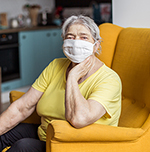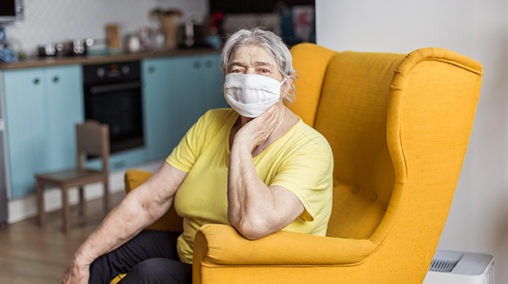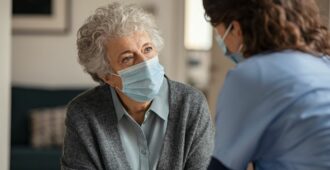
Over the past 12 months, the Sax Institute’s 45 and Up Study has conducted rapid online surveys to understand how the pandemic has impacted the health of older Australians. This valuable data will be made available to researchers in 2022.
With a large sample size of more than 30,000 recipients, the COVID Insights surveys offer one of the most reliable sources of evidence on community experiences and attitudes relevant to COVID-19 in Australia. Supported by a NSW Government grant, these surveys are being used to understand the ongoing effect of the COVID pandemic on people across NSW, and support policy, planning and research into health and wellbeing.

In total, there are four COVID Insights surveys:
- Survey 1: completed November to December 2020
- Survey 2: completed February to April 2021
- Survey 3: completed June to September 2021
- Survey 4: completed September to December 2021
Using COVID Insights data for your research
In 2022, the full set of COVID Insights survey data will be made available to approved researchers. This offers a unique opportunity for researchers to explore a huge cohort of participants across NSW, including their health experiences during the pandemic, how their circumstances have changed over time, and even link results with a range of health datasets.
If you would like to apply for access to COVID Insights data, email us on 45andUp@saxinstitute.org.au
What have the surveys revealed so far?
The surveys offer a real-time snapshot of health and wellbeing during the pandemic across a range of areas, including mental health, lifestyle, physical activity, diet, sleep, alcohol use, access to health services, and the compounding effect of bushfires and drought.
With such a large and diverse cohort to draw from, the COVID Insights survey data is particularly useful for research exploring the impact of COVID on priority groups such as carers, older people with a disability, and those under financial distress. Recent survey results have also yielded fascinating insights into people’s varying concerns, barriers and access to vaccination.
Vaccination
Understanding attitudes to vaccination has been a critical concern during the vaccination rollout. A survey, carried out between June and September 2021, found that 90% of participants felt the COVID-19 vaccines were either moderately or very safe. More than two-thirds (69%) of those not yet vaccinated said they intended to get the vaccine, with 10% reporting either that they would not or were unsure about vaccination.
A key challenge for policy makers is ensuring effective access to vaccination. Our survey found that 70% of those already vaccinated reported getting the vaccine was very easy, with only 4% responding that it was not at all easy. However, 29% of people yet to be vaccinated said it was not at all easy to get the vaccine. Those living in most disadvantaged areas (32%) and outer regional areas (33%) and people with multiple chronic conditions (32%) were more likely to report that it was difficult to get vaccinated.
In the coming months, as restrictions relax, it will be important for policy makers to understand how behaviours are changing, views about booster shots, and the extent to which social distancing, mask wearing and getting tested are continuing. In our survey, 97% of people said they were moderately or very likely to wear a mask during an outbreak once they’re fully vaccinated. Practising physical distancing and hand hygiene post-vaccination were also supported, with 93% and 98% of people, respectively, saying they were moderately or very likely to continue once vaccinated. However, once vaccinated, only 75% of people said they would get a COVID test if they had cold or flu symptoms.
Missed healthcare and mental health
The latest survey conducted from September to December 2021, also features questions in other important areas of concern, such as missed healthcare and mental health during the pandemic. Around 16% of survey respondents missed or delayed a healthcare appointment in the previous month, most commonly a dentist (53%) or GP (32%) appointment. Sixty-five percent of those hadn’t subsequently sought another appointment yet. The reason for missing or delaying healthcare was most commonly because it was not deemed urgent (39%), although 21% cited fear of catching COVID.
Missed cancer screening is a particular concern, with 9% of women under 75 saying they missed breast screening due to the pandemic, half of whom had still not caught up by the time they were surveyed.
The news on mental health is mixed: while 94% of respondents report their quality of life as good to excellent, 9% were intensely lonely. Around a third of those surveyed said their mental health had worsened due to the pandemic (up from 10% in a survey carried out earlier in the year) with people with disabilities and carers suffering much more. Financial issues were also a major concern, with 32% worried that their money wouldn’t last and 12% never or rarely having money left over at the end of the month and 3% concerned about becoming homeless.
If you would like to apply for access to COVID Insights data, email us on 45andUp@saxinstitute.org.au





